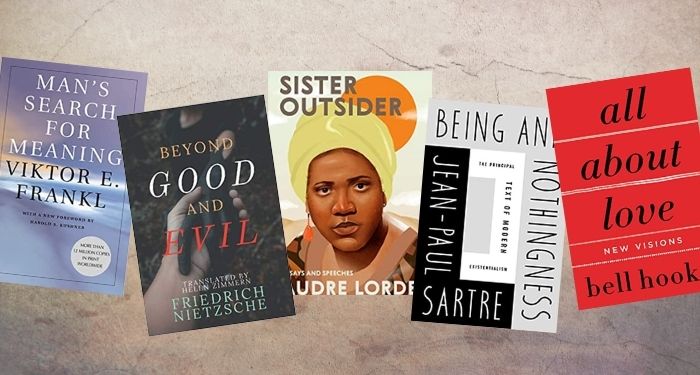
Asking questions is part of being human, and if you have a lot of questions about the meaning of life, how we spend our time on earth, the power systems and structures we live in, and what we owe each other, then pick up any one of these essential books on philosophy for beginners. We’ve included a range of ancient classics to more contemporary ruminations that will help guide you to think more deeply about life. Because of the nature of this genre, there is a lack of female writers but we tried to balance things out by including editions translated and edited by women. However, if you need some help finding more great philosophy books by female writers, then check out TBR: Tailored Book Recommendations, and we can help you out!
Analects by Confucius, translated by Annping Ching
Defining integrity and how to live and rule in a moral way, this book collects the teachings, wisdom, conversations and lessons of Confucius, as compiled by his followers and translated by one of the most eminent Confucius scholars of our times.
Tao Te Ching by Lao Tzu
Discover a path to peace in this ancient text about finding the Way, the source of all existence. This meditation is based on an early English translation of the ancient text beloved by countless practitioners for centuries.
The Republic by Plato
Presented as a series of conversations between Plato and others, this text explores big questions about communities and the roles we all play within them, and asks big questions about the state of peace, knowledge, and what it means to be good.
Critique of Pure Reason by Immanuel Kant
What are the bounds of human consciousness and its ability to think and reason? Kant builds upon the work of other philosophers of his time to explore the nature of intuition and knowledge and how life experience adds to the human sphere of intelligence.
Beyond Good and Evil by Friedrich Nietzsche, translated by Helen Zimmern
For so long Western society has fallen back on the teachings of Christianity in order to help them decide what is good and evil, and Nietzsche argues here that this system is flawed and it is up to each person to question and explore what is right and assert their own wills.
Being and Nothingness by Jean-Paul Sartre, translated by Sarah Richmond
How do we create meaning in life? Sartre argues that it is each person’s journey and responsibility to find meaning in life through their choices, and that freedom of choice is essential.
A Vindication of the Rights of Women by Mary Wollstonecraft
One of the earliest Western manifestos for the rights of women, this book argues passionately not just for women’s rights, but also for the education of women and for greater responsibilities of women in family life. Although not a perfect call for rights by any means as it was first published in 1792, this book is nonetheless an essential entry into the philosophical canon.
Man’s Search for Meaning by Viktor Frankl
Part memoir and part philosophical treatise, Frankl recounts his experiences witnessing the horrors of the Holocaust and surviving the concentration camps, and he makes an argument that the primary drive in humanity is not for happiness, but for discovering and defining meaning.
Sister Outsider: Essays and Speeches by Audre Lorde
A feminist, cultural critic, and scholar, Lorde offers incisive essays and arguments about racism, sexism, ageism, and homophobia, and discusses how they are all interconnected, but also how our differences are what should motivates us to work for the greater good.
All About Love: New Visions by bell hooks
In this collection of essays, hooks challenges readers to think of love as a verb, not a noun. Her premise here is that our society suffers from a lack of love and compassion that is accompanied by action for others, and that is what divides society. By probing at the definition of love and redefining it in this context, hooks offers a compelling argument for how and why we should look after each other.
Curious for more recommendations?
- Check out some of the best Christian allegory books
- Peruse some of these nonfiction book club questions to help guide you through your reading
- Discover some of the beat nonfiction book subscription services
If you’re looking for more specific reads on certain topics or to expand your reading, sign up for TBR: Tailored Book Recommendations! TBR is a personalized book recommendation service that sends you books you’ll love to read. Here’s how it works: Simply fill out the reader survey and let us know what you want more of—such as philosophy books for beginners—and what you’re not keen on. Then, an expert Bibliologist will read your responses and recommend three books just for you. Receive your recommendation letter via email in about two weeks, or opt to receive your recommendations as brand new hardcovers in the mail in about three to four weeks. Learn more and sign up now!